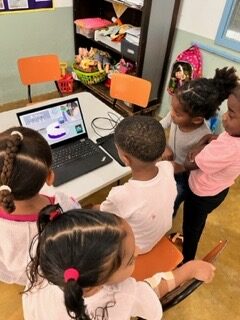Combining Game Production and Math to Help Underserved Children in Brazil
How can we motivate young children to become interested in learning math worldwide?

That was the question posed in an extra credit assignment in Professor Eugene Allevato’s MA-100 pre-statistics class. The question’s winning answer? A fun and engaging game based on ordering pies that teaches the concept of fractions to children ages 5 to 7 years old.
Understanding the concept of fractions is a challenge for early learners, but it builds the foundation for solving equations successfully later in algebra. Woodbury Gaming major Christie Iseki proposed the idea and then formed a team of fellow students to bring the idea to fruition.
Dr. Allevato wasted no time introducing the game to young students in an underserved neighborhood in Brazil where he has worked for the past four summers.
Located in Sao Joao de Meriti, Brazil, the Community Activities Center (CAC) is a philanthropic institution that has partnered with UERJ on various educational activities since 1990. Dr. Allevato has worked with the CAC community to instill STEM activities in order to promote careers in math and science for their youngest members. He plans to be on site for two months in Summer 2024 to teach, train interns, and oversee development of the project.

“As I arrived at the community center in Brazil, the kids were thrilled to see me again after two years away due to the pandemic restricting my travel,” Dr. Allevato recalls.
Dr. Allevato’s goal in working with CAC is finding a way to entice students’ curiosity and motivate them to learn math. “Woodbury students’ idea to create a game to introduce the concept of fractions was remarkable in awakening the children’s curiosity by rooting the imagination in a concrete reality while simultaneously imagining possibilities beyond that reality,” he explains.
According to Dr. Allevato, introducing the gaming program in Brazil is just the first step. The next step will be utilizing the program in an elementary school in Portugal in a more socially and economically diverse 1st-grade classroom. The level of learning outcomes and students’ motivation will be monitored, evaluated, and compared.
But the rewards and possibilities of this initiative extend far beyond the classroom. “The feelings and rewards I gained from working with this community center in Brazil give me the strength and hope that education may be the answer to inequity and social justice,” Dr. Allevato explains. “The idea is to influence the beginning of history to cause social change.”
What Woodbury Students Are Saying
“I think that gaming can make math concepts easier to understand, especially for children. It helps foster a fun learning environment providing a new way to learn math. For us, it was not just an extra credit assignment but an opportunity to create and work on a project related to our major while learning math and helping a community where children need to overcome equity barriers.” Christie Iseki (Gaming Student)
“Our focus was on making sure the game concept was visually appealing to children, fun, and engaging to play. We settled on a restaurant-type arcade-style game allowing children to replay it and go for a higher score; it also provided a good tutorial introducing them to the math concept of fractions in a cute and fun way.” Jacob Abraham (Gaming student)
“Proper teamwork was one of our biggest priorities while working on this project. Before production even began, we had quite a few conceptual meetings that were solely focused on crafting how the game would introduce the concept of fractions. I attribute our success to the motivation and the synergy between our team to overcome the challenges during production.” Jeremy Barretta (Gaming student)
Last Updated on August 25, 2023.